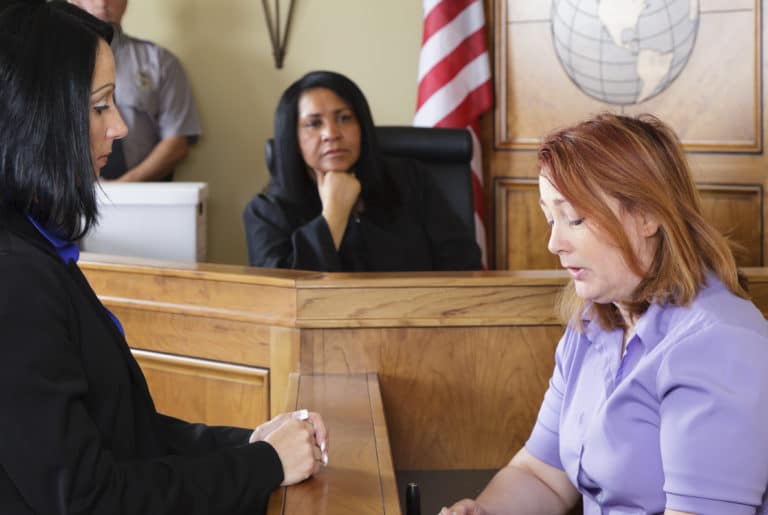How Are Wrongful Death Settlements Paid Out?

Navigating the death of a loved one can be a confusing and overwhelming experience that is compounded when that death was caused by the negligence of another. A wrongful death lawsuit allows you to hold those who caused the accident accountable and helps you seek the justice and closure you and your family deserve.
Filing a wrongful death claim also allows you to recover compensation to cover losses you and your family members are suffering. This compensation can help you cover bill payments, lost wages, and the pain and suffering you are experiencing.
Contact the experienced wrongful death attorneys at Bachus & Schanker today to schedule a free consultation.
How to obtain a wrongful death settlement
A wrongful death lawsuit is a civil claim brought against a negligent party. This negligent party can include an individual, a business, a larger company, and even townships or other localities. No matter the defendant, a wrongful death claim must include the following elements to be successful:
- Negligence – Negligence is the failure to act in a manner that entails ordinary or reasonable care to others. You must establish that the named defendants had a duty to provide safety for eligible individuals and that failure to uphold this level of reasonable care resulted in a breach of duty. Negligence can include intentional conduct or purposeful harm.
- Death of a person – Death needs to have occurred in order to bring forward a wrongful death claim.
- Causation – You must establish that the individual’s death was the direct result of a negligent act that occurred.
- Damages – You must show that damages were suffered by the victim’s loved ones as a result of the death. Damages can include loss of income, burial and funeral expenses, pain and suffering, and other tangible and intangible losses.
Who can file a wrongful death claim?
Like many states, Colorado offers detailed legal guidance on who can bring forward a wrongful death claim and when they can do so. The law places a priority on those closest to the victim as well as those who relied on the victim as dependants.
Colorado law allows only “heirs” of the victim to bring forward a wrongful death claim. The state defines heirs as individuals who are ‘lineal descendants’ of the victim. In the first year after an individual’s death:
- A spouse may bring forward a wrongful death claim
- If there is no spouse, children are allowed to file a claim
- If the decedent had no children, parents are able to file
After the first year, the state allows heirs to file a wrongful death suit as well. Heirs may be eligible to file a wrongful death claim on their own or they can join the claim of a surviving spouse or heir who has already filed. If a decedent has a named beneficiary, then that named beneficiary can bring forward a claim as well. Siblings are not legally allowed to bring forward a claim, even if they are the only surviving relatives.
Who can receive a wrongful death settlement?
When a settlement is reached in a wrongful death lawsuit, the plaintiffs who bought forward the claim will typically receive the settlement award. In some cases, settlement awards will be distributed among surviving family members, including children and other dependents.
If the lawsuit was brought forward by a designated beneficiary or the decedent’s estate, then the settlement might be distributed amongst survivors. They may also go into a trust where specific amounts will get allocated to other named beneficiaries.
While a sibling cannot bring forward a wrongful death claim, in unique circumstances, money from the settlement may be allocated for surviving siblings. However, this is usually done through another legal outlet and is not typically the norm.
Who pays compensation in a wrongful death lawsuit?
When a wrongful death settlement is reached or a verdict is decided, the insurance company typically will be responsible for making payment. If there is no insurance company involved, the named defendants will be responsible for making the payment.
Depending on the settlement terms, the defendant may also need to satisfy any attorney fees, court fees, or other fees that may have been incurred during the litigation.
The defendants of a wrongful death lawsuit can vary from individuals to large corporations and even government agencies. All named defendants, aside from specific individuals, will usually have an insurance policy that will pay out compensation in a wrongful death judgment.
Common defendants named in a wrongful death lawsuit can include the following:
- An individual can be held personally liable for wrongful death and will be responsible for any damages awarded.
- A small business or large corporation. In addition to paying out compensation, they may also be held responsible for paying any fines or fees related to the wrongful death.
- Law enforcement agencies
- Employers, if the wrongful death occurred at a place of work
- Environmental organizations
- Government agencies
- Townships, cities, and other jurisdictions
- Medical facilities such as hospitals or treatment centers
What damages are available for a wrongful death claim?
When filing a wrongful death claim, plaintiffs can seek compensatory damages that include both economic and non-economic damages. These damages are designed to compensate a victim’s family for their losses and pain and suffering. In unique cases, punitive damages may also be rewarded. These are designed to punish a defendant for their negligence and are usually levied against larger companies, organizations, or agencies.
Economic damages
Economic damages are designed to compensate a victim’s surviving family members for any financial losses that they incurred as a result of the wrongful death:
- Loss of earning capacity
- Loss of wages and income
- Medical expenses for any treatment incurred after the accident
- Hospital bills, treatment bills, and other bills associated with the care of the victim
- Funeral and burial expenses
- Loss or damage of physical property
Colorado does not observe a cap on economic damages. This means that surviving family members can recover 100% of the economic losses they sustained because of their loved one’s death.
Non-economic damages
Non-economic damages are designed to compensate surviving family members for the pain and suffering they’ve endured because of the loss. Unlike economic damages, non-economic damages are not tangible and can be difficult to assess. Because of their unique nature, Colorado law follows many states in applying a cap on non-economic damages. Colorado’s current cap on non-economic damages is $250,000. In unique circumstances, this cap can be increased to $500,000.
How much do wrongful death lawsuits pay?
Because of the severity of a wrongful death lawsuit, and the devastating and unimaginable loss of a loved one, a wrongful death lawsuit typically offers a larger settlement amount than any other civil suit. Lawsuit payouts vary, depending on the circumstances of the accident.
On average, wrongful death lawsuits can range anywhere from half a million to $1 million. In unique cases of wrongful death, especially one that is filed against a large corporation or entity, settlement amounts can be well beyond tens of millions of dollars.
In all settlement payouts, a plaintiff may have options available when deciding how they will receive compensation:
Lump sum payment
With a lump sum payment, a plaintiff will receive a single payment of the total settlement amount.
Structured settlement
In a structured settlement, a defendant will pay out settlement funds in the form of installments over a predetermined period of time. Payment can range from a couple of months to a couple of years. Once a structured settlement agreement is established, it is very hard to change. It’s important to work carefully with an experienced wrongful death attorney if you are contemplating a structured settlement.
Do you have to pay taxes on a wrongful death settlement?
With both a lump sum payment and a structured settlement, they may be subject to taxation by the IRS. Typically, compensation that is awarded under non-economic damages is not taxable. However, if you’ve been awarded punitive damages, you can expect to be taxed on a portion of the settlement award.
When reporting your taxes to the IRS, it’s important to distinguish the category under which your settlement funds fall — compensatory or punitive — as this will aid the IRS in taxing you appropriately.
How are funds paid out?
Settlement funds must be distributed in a manner that is fair and reasonable. This typically means that the spouse will receive the largest sum of the settlement. If there is no spouse, any qualifying children or parents next in line will receive the largest distribution. Any other surviving family members who can show that they suffered significant loss because of the loved one’s death may be eligible to receive payment as well.
Once it’s determined who is going to receive what, funds will be distributed, typically with a check or a bank account deposit. In some cases, including those involving minor children, payments will be funneled to a trust that a beneficiary will be able to access at a predetermined time, usually when a minor turns 18.
How long does it take to get paid out?
The more complex the case, the longer you can expect it to take before a resolution is decided. Generally, it can take anywhere from a year to 5 years to settle a wrongful death lawsuit. Once a settlement is reached, the date of funds distribution is decided. This will usually take a couple of months. Shortly after, plaintiffs can expect to receive payment.
Work with a wrongful death lawyer

Working with an experienced wrongful death attorney can help you and your loved ones recover the compensation, justice, and accountability you deserve. For families navigating the death of a loved one at the hands of a negligent party, it’s important to tap into resources that can help you navigate these trying times.
Kyle Bachus, the experienced and dedicated attorney and author of the best-selling book “Unthinkable” is committed to helping families navigate the road ahead after experiencing the loss of a loved one or catastrophic injury that was brought on by another party’s negligence.
Contact our wrongful death attorneys for assistance today to learn more about your rights and options.
Sources:
Economic damages. (2023).
Non-economic damages. (2023).
Tax Implications of Settlements and Judgments. (2022).
2021 Colorado Code Title 13 – Courts and Court Procedure Article 21 – Damages Part 2 – Damages for Death by Negligence § 13-21-201. Damages for Death. (2023).




